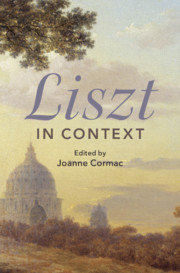Book contents
- Liszt in Context
- Composers in Context
- Liszt in Context
- Copyright page
- Contents
- Illustrations and Tables
- Contributors
- Preface
- Part I People and Places
- Part II Society, Thought and Culture
- Chapter 10 The ‘War’ of the Romantics
- Chapter 11 Visual Art and Artists
- Chapter 12 Literature and Literary Heroes
- Chapter 13 Liszt, Women and Salon Culture
- Chapter 14 Liszt as a Writer
- Chapter 15 Patronage
- Chapter 16 Liszt and the Networks of Revolution
- Chapter 17 Liszt’s National Identity
- Chapter 18 Liszt and Religion
- Part III Performance and Composition
- Part IV Reception and Legacy
- Further Reading
- Index
Chapter 15 - Patronage
The Court
from Part II - Society, Thought and Culture
Published online by Cambridge University Press: 23 September 2021
- Liszt in Context
- Composers in Context
- Liszt in Context
- Copyright page
- Contents
- Illustrations and Tables
- Contributors
- Preface
- Part I People and Places
- Part II Society, Thought and Culture
- Chapter 10 The ‘War’ of the Romantics
- Chapter 11 Visual Art and Artists
- Chapter 12 Literature and Literary Heroes
- Chapter 13 Liszt, Women and Salon Culture
- Chapter 14 Liszt as a Writer
- Chapter 15 Patronage
- Chapter 16 Liszt and the Networks of Revolution
- Chapter 17 Liszt’s National Identity
- Chapter 18 Liszt and Religion
- Part III Performance and Composition
- Part IV Reception and Legacy
- Further Reading
- Index
Summary
Few surprises in the history of nineteenth-century music are more dramatic than that of Franz Liszt’s sudden move to Weimar in 1848. The decision to exchange an immensely successful career as a virtuoso pianist for the life of a Kapellmeister baffled many of Liszt’s contemporaries. Although he had held an honorary position as ‘Kapellmeister Extraordinaire’ in Weimar since 1842, he had spent no more than several days at a time in residence. Few understood the motives behind Liszt’s sudden decision to move to Weimar permanently, but hindsight reveals they were well-calculated. Liszt was no longer flourishing psychologically. As a soloist, he had spent the last decade engaged in a series of gruelling, trans-continental concert tours that required him to interact directly with thousands of fans. ‘I have spent the past six months living a life of shabby squabbles and virtually sterile endeavours’, Liszt wrote to his friend, George Sand. ‘I have willingly laid my artist’s heart open to all the bruises of an active public life.’1 Simply put, Liszt was worn out, and he imagined that a move to Weimar would enable him to escape the emotional labour2 he had been forced to engage in for years as a touring musician.
- Type
- Chapter
- Information
- Liszt in Context , pp. 133 - 140Publisher: Cambridge University PressPrint publication year: 2021



